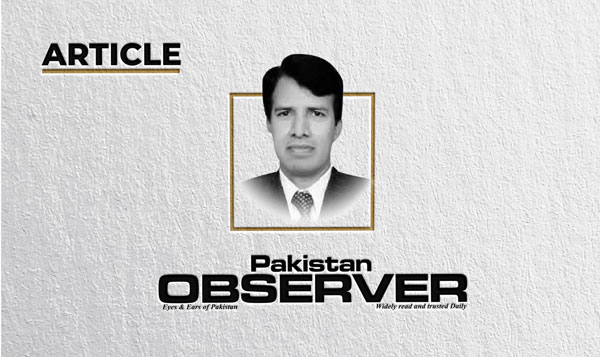Pakistan foreign policy and domestic front
There is an intimate linkage between domestic and foreign policy of any state. A domestically cohesive and integrated state will have comprehensive and strong foreign policy viz-a-viz a fragile state.
Like any other state, foreign policy of Pakistan has always been deeply impacted by domestic policies and politics of its political parties and elite class.
Ever since 1970s, the objectives and contours of the foreign policy of Pakistan generally remained same, however the implementation strategies varied over time.
The implementation strategies and personal influences brought inconsistency in the foreign policy pursuits of Pakistan during various eras.
The undemocratic and non-professional approaches, used for the implementation of foreign policy over the decades resulted into relegation of national interests of the state of Pakistan while promoted the personal interests of few politicians and people with vested personal interests.
These strategies made the foreign policy of Pakistan as people centric rather being state centric foreign policy based on its national and strategic interests of Pakistan.
Even after seventy-five years, foreign policy of Pakistan is facing the same dilemma. The biggest dilemma in the foreign policy is of Pakistan is a process of dictation by external forces having their linkages with various ruling elites and key personalities.
Ideally, states formulate their foreign policies on sound basis to pursue their national interests’ keeping contemporary and future regional and global environment.
In this process, apart from international milieu, the domestic position of a state plays a dominant role towards formulation of a sound and futuristic foreign policy.
In a way, the foreign policy can be regarded as the sum total of the domestic polices of a state but not the policies of political parties and elites.
The foreign policy objectives of Pakistan are derived from Article 40 ofits constitution of Pakistan which provides a clear guidelines to pursue its national interest viz-a viz its neighbours, Muslim world and major powers.
In the light of these guidelines, the “Pakistan’s Foreign Policy seeks to protect, promote and advance Pakistan’s national interests in the external domain.
” For the promotion, protection and advancement of national interests of Pakistan, a strong domestic character of the state and its institutions is most desirable.
Whereas, the Ministry of Foreign Affairs play a crucial role in the formulation and pursuance of foreign policy objectives, all other ministries, institutions and organizations provide needed support and supplement the Foreign Ministry with their input in their respective areas of interests and future plans.
“Peace with all, and enmity with none” is the hallmark of Pakistan’s foreign policy as stated by the father of nation, Quaid-i-Azam Mohammad Ali Jinnah.
While giving the outline of the state’s foreign policy in 1948, Quaid-i-Azam said, “Our foreign policy is one of friendliness and good-will towards all the nations of the world.
We do not cherish aggressive designs against any country or nation. We believe in the policy of honesty and fair play in national and international dealings and are prepared to make our utmost contribution to the promotion of peace and prosperity among the nations of the world.
From the perspective of its foreign policy pursuits, there has been gradual relegation in the status of Pakistan.
Pakistan had an excellent standing in the comity of nations at global until 1960s. It remained a very active member of the international community.
Being part of the western world, Islamabad was able to pursue its national interests with lot of initiative and drive.
Two dominant domestic factors played key role during the initial two decades of Pakistani history.
It was the pivotal geopolitical location of the state and the national integration of Pakistani society.
The state and society of Pakistan acted as one unit under the strong ideological and sociological order.
Besides, all the state institutions worked well to their optimal position towards state and nation building.
There developed a strong bondage between masses, national institutions and the state. Then there appeared cracks in the domestic politics of Pakistan and ruling elites failed to bridge these evolving fault lines.
Resultantly, Pakistan was disintegrated in 1971. No doubt, in this disintegration, the external powers and neighbouring India played negatively and aggressively but a lot was found wanting in the domestic politics of Pakistan, especially the elite class ruling the country at the time of disintegration and even before that.
The disintegration of Pakistan was result of a deviation from the basic concept of ideology of Pakistan, element of national power (integration and cohesion) and above all the grave aberration from the golden principle of; unity, faith and discipline.
To achieve national integration, the factors like; religion, language, culture, tribes, casts and ethnicity though play significant role, yet need harnessing under a single factor; the Pakistani Nationalism.
Unfortunately, the factors which led towards the disintegration of Pakistan are getting stronger and stronger with each passing day.
There are multiple fault lines appearing at the socio-political level in Pakistan today. The ethnic factor which is enlarging and strengthening in various parts of Pakistan with undesired motives and elite class and political parties are either quite or indecisive over these dangerous trends.
The sectarianism is dividing the society with each passing day. There is a rapidly evolving trend of radicalization in some parts of Pakistan with TTP remerging as strong terrorist group.
Besides, there is a political polarization, rapidly dividing the society towards a socio-political flop.
Under the on-going critical situation, let’s be united internally at all levels; strengthen the domestic character of the state where all institutions, provinces, political parties and masses contribute towards national unity and harmony.
The political parties, the elites and the stakeholders must contribute positively towards national cohesion and integration through a national approach.
In fact, a domestically strong Pakistan can pursue its national interests through foreign policy with lot of perseverance, flexibility, freedom and foresight at international level.
— The writer is Professor of Politics and IR at International Islamic University, Islamabad.










